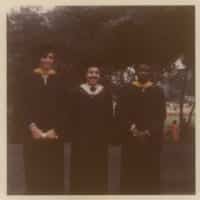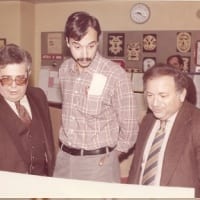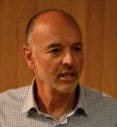On Wednesday, we published an Around the Web article, Is the U.S. All Wrong? Teacher Training Breaking the Mold garnered a lot of conversation. David Greene contributed an initial response to the larger discussion and felt compelled to expound on his position here.
Reaction
Having taught four decades, and having had the privilege of working with so many talented and experienced educators throughout those four decades, I can say, beyond the shadow of a doubt, that becoming a good teacher takes time. Not only do you need time to develop and hone your skills, you need time to learn about kids and “how they work.” You don’t develop these skills in a vacuum, but through the mentoring, assistance and wisdom of more experienced people with years of experience, proven methods, strategies, best practices and techniques.
I graduated from Fordham University’s undergraduate School of Education in 1970. Fordham undergraduate  education was probably considered a 2nd tier University, yet it produced a large number of excellent teachers in and around NYC, and I will lay odds that it was better at producing high quality teachers than many a top tier university. The program no longer exists. It was merged into a graduate program.
education was probably considered a 2nd tier University, yet it produced a large number of excellent teachers in and around NYC, and I will lay odds that it was better at producing high quality teachers than many a top tier university. The program no longer exists. It was merged into a graduate program.
Our four years included heavy academic work in our subject area, class work in pedagogy, and fieldwork in local neighborhood, afternoon centers. All of that was before you began a full-time, semester-long internship as a student teacher. The pedagogy classes weren’t worth much, but that’s true in all schools of education. That is because more are still taught by researchers and less by experienced public school teachers. I have always believed that more practical experience with great teachers beats theory taught in an ivory tower.
University education programs must get with the proverbial program. The ivory tower is too blinded by its own light. They must retool and develop more in-school mentor programs rather than rely on pedagogy classes that, well, for the most part, are less than helpful. They have to put more emphasis on fieldwork and internship work. If schools of education want to improve teaching they must make teacher training more similar to the other “life saving” professions, plumbing and medicine. They both include long periods of apprenticeships and ongoing certification before permanent licensing. As long as they think PhD academics are more important than teacher training, things won’t change much.
A major difference between my generation and present-day new teachers in quick fix programs like Teach for America, or even some university based programs, was that I gradually entered teaching. I wasn’t dumped into quicksand up to my neck. When I student taught I was extremely lucky to have a cooperating teacher, Phyllis Opochinsky, (think hospital attending physician) a young master who, in turn, had been trained by an older master, Mr. Milton Belasco, chairman of the social studies department and author of textbooks and Regents review books. Unknowingly, I became part of the chain that passed down “practical wisdom” from one teacher generation to the next.
The first few weeks, I did nothing but watch her, learn from her work, and practice writing lesson plans with her. I was then, on occasion, allowed to teach one of her classes. Then, when she thought I was ready, I took over one of her classes as my own, but always with her in the room: By law, she had to be there. More importantly—she was there for me. We had pre- and post class discussions to work on improving my techniques. As good as that experience was, it should have lasted a full year. There is no better way to learn to teach than by this process: having a master cooperating teacher at your side, letting you fail, helping you succeed, coaxing, pushing, and teaching you how to teach. It is how many generations of great New York City teachers were made. Somehow, this process was lost over the past couple of decades. Perhaps, it will now be regenerated.
The second difference was where and for whom I worked when I started my first job in 1970, at the brand new Adlai E. Stevenson High School, also in the South Bronx. As far as the public knew, we were the gang-filled, violence-laden school with championship basketball teams whose leading players, Ed Pinckney (currently a coach for the Denver Nuggets) and Fred Brown (now a successful financial advisor in the DC area and philanthropist) became famous playing for Villanova, Georgetown, and the Boston Celtics. We were stereotyped. The reality was that it was a great place to teach, to learn to teach, and to go to school.
Stevenson High School, also in the South Bronx. As far as the public knew, we were the gang-filled, violence-laden school with championship basketball teams whose leading players, Ed Pinckney (currently a coach for the Denver Nuggets) and Fred Brown (now a successful financial advisor in the DC area and philanthropist) became famous playing for Villanova, Georgetown, and the Boston Celtics. We were stereotyped. The reality was that it was a great place to teach, to learn to teach, and to go to school.
My immediate supervisor, Department Chair and Assistant Principal Bertram Linder, and my principal, Leonard Littwin, were also master teachers of social studies and gifted mentors of new teachers. Together they gave me the foundation to become a confident teacher in my field of study. They also gave me academic freedom. They trusted my intelligence and creativity. As a result, I knew I could grow, and grow I did.
When I started in Stevenson, I was given a lousy schedule. I was to teach world history to the least academically motivated ninth-graders in the school. There were no peer mentors. My only assistance was to come from Misters Linder and Littwin. As a non-tenured teacher, I could be observed informally as often as they wished. Formally, I was to be observed least three a semester. That was six times per year for each of my three non-tenured years. If after eighteen full formal observations they couldn’t evaluate me, everyone had a problem. Thank God they did. I survived because of Bert and the Vince Lombardi of principals, Leonard Littwin.
Bert’s visits and follow-up discussions gave me confidence by telling me he knew I would—as a first-year teacher—make lots of mistakes, but I had the essential tools to become a great teacher. He gave me responsibilities, gave me reviews to write for the Journal of New York City Teachers of Social Studies, and saved my ass more than once.
For example, one very hot, Friday afternoon, I had an eighth (last) period class. They clearly didn’t want to be there. One student decided to “test” me by walking up to a window, opening it, and climbing on to the sill. As I stood there dumbfounded, Bert walked in the room to observe me. “Oh shit,” I thought; I was finished. Monday I’d be driving a cab. Bert stayed and watched the class I could barely control, let alone teach as I talked the kid down from the ledge. Bert’s presence probably helped. When the class ended, he told me to see him later. Later turned out to be Monday. Surely, I was going to be given a U (unsatisfactory).
When I met with him on Monday, he said three things. First, how bad my lesson was. Second, he wasn’t going to count it as an observation, because he remembered teaching classes like that when he was younger. Third, we discussed how to use my personal strengths to counteract what technical weaknesses I had because I was new. He encouraged me by saying that once my technique caught up with what I brought to the classroom, I would be the master others could come to learn from. And I thought I was to be fired.
Littwin scared people, but Lenny knew teaching. He was blunt and direct. He sat in the back of classrooms, watching and taking notes. He was a master social studies teacher before he became an administrator. His goal, which he filtered down to his department chairs, who filtered it down to their teachers, was to develop as many talented teachers as possible. Mostly, he succeeded. Many succeeded to pass on what they learned, including me. What he told me, he must have shared with hundreds of teachers over the years. He asked three essential questions:
What do you want your students to know, understand, do, and communicate by the end of your class?
How are you going to assess those?
What do you want them buzzing about as they leave, so that they want more tomorrow?
With those questions as our focus, we discussed how projected outcomes, goals, and objectives are to be achieved and measured using authentic assessments (essay writing, projects of all sorts, and even multiple-choice and short-answer questions). These three fundamental questions still define great teaching, regardless of what the new “data driven” reform movement says.
How ironic that, in the fall of 2008, I found myself mentoring a TFA Corps Member in the “campus” that once was A.E. Stevenson. Many of the old offices were converted into classrooms. My mentee and I were sitting in his classroom, which at one time was Littwin’s old office. Low and behold, what comes out of my mouth?
“What do you want your students to know, understand, do, and communicate by the end of your class?” “How are you going to assess those?” “What do you want them buzzing about as they leave, so that they want more tomorrow?”
Our subsequent discussions about what was necessary to make those happen was the basis for my mentee’s success in that school and subsequent hiring in a school of his choice. That is how you pass on the traditions of great teaching. Over the past forty-five years, I have worked with several student teachers and nineteen TFA Corps Members as well as younger colleagues. Their success is not due to anything more than my passing forward what I have learned from those old masters from Stevenson.
Today’s “reform” business model precludes principals from being effective leaders of teachers. Most don’t really know how. Teachers need experienced supervisors and mentors as well as real mentoring programs. There are thousands of retired, high-quality teachers willing to become mentors. Why not use them? Will there be any “old” masters left to pass forward what makes great teaching? Will there be any Littwins, Linders, or even Greenes left to pass on what they learned from those before them? Will there be any lifetime teachers? Will public education as we knew it be crushed and replaced by a system of short-term, temporary, robotic teachers who simply follow a conveyor-belt script in this new, factory like, privatized, education-for-profit system, and then move on to another job when they burn out?
Five of the most important reminders I have learned throughout my career:
- Listen to and learn from the best teachers you know. Think about what your best teachers did. Given that, know thyself. What works or some doesn’t work for all.
- Know your kids. If you come from a different environment than them, learn as much as you can about it. Immerse yourself in it. Understand their needs, not just as a sociological group, but also as individuals….
- Whatever original methodology you were taught, don’t get stuck in it. Learn to adapt. Develop a BIG toolbox of methods, both in pedagogy and human relations. Keep analyzing your work. Always try to get better, no matter how self gratified you might be.
- Be genuine. Use humor if you can. Develop mutual respect. Trust. Be both firm AND caring. Be a good listener. Conduct a class, don’t control it.
- Set challenging, but reachable, goals. Don’t give busy work. That is a quick turn off. Kids need to know why what they do is important to them. Be tough when necessary, but fair. Be understanding!
Good teachers learned these five important points from their mentors. They know that these points must be continued to be passed forward to future generations of teachers to continue to create optimal leaning atmospheres possible regardless of socioeconomic environments and the falsehood of standardized test measurements of success.
Teaching is an art, to be cherished, not lost and mummified. Our students should not become guinea pigs in a Fahrenheit 451 world of mathematical schema and “data-driven” engineering. Lifelong teachers must be allowed to continue to use our God-given abilities to think, reason, and create. Will we be allowed to, or will we, like other endangered species, just become extinct?
Subscribe to edCircuit to stay up to date on all of our shows, podcasts, news, and thought leadership articles.



